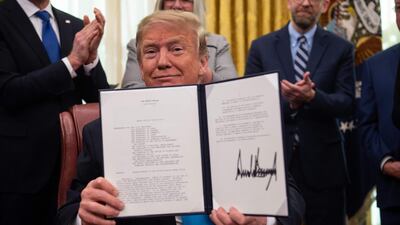The US Senate voted overwhelmingly on Tuesday to pass a $738 billion defence policy bill that creates President Donald Trump's "Space Force" and gives federal employees 12 weeks of paid parental leave.
The Senate has sent the bill to the White House, where Mr Trump has promised to quickly sign it into law.
The Republican-controlled Senate voted 86 to 8 in favour of the National Defence Authorisation Act. The Democratic-led House approved the bill by 377-48 last week.
Mr Trump said on Twitter last week that he would sign the bill as soon as it passed because it included all of his priorities.
One of the few pieces of major legislation Congress passes every year, the act is a vehicle for a range of policies and sets factors including military pay level and which ships or aircraft will be modernised, bought or scrapped.
This year's legislation included a 3.1 per cent pay increase for the troops, the first paid family leave for all federal workers, and the Space Force, the first new branch of the US military in more than 60 years and a top military priority for Mr Trump.
The House and Senate voted for a version of the act earlier this year.
Then politicians negotiated for months with representatives from the White House to reach the compromise that just passed.
A few left-leaning Democrats and libertarian-leaning Republicans voted against it because it did not include policies that would have restrained Mr Trump's war powers.
Some also objected to the increase in spending as the national debt is skyrocketing.
"Conservatism is about more than supporting military spending at any cost," Republican Senator Rand Paul said.
The act also does not bar the Mr Trump from using military funds to build a wall on the US border with Mexico.
Those provisions were included in the House's version of the act but not the Senate's. They were removed during the negotiations.
Democrat leaders said they had extracted some concessions from Republicans, including the 12 weeks of paid family leave for federal workers.
The fiscal 2020 act increases defence spending by about $20bn, or about 2.8 per cent.
It includes $658.4bn for Department of Defence and Department of Energy national security programmes, $71.5bn to pay for ongoing foreign wars and $5.3bn in emergency funding for repairs from natural disasters.

